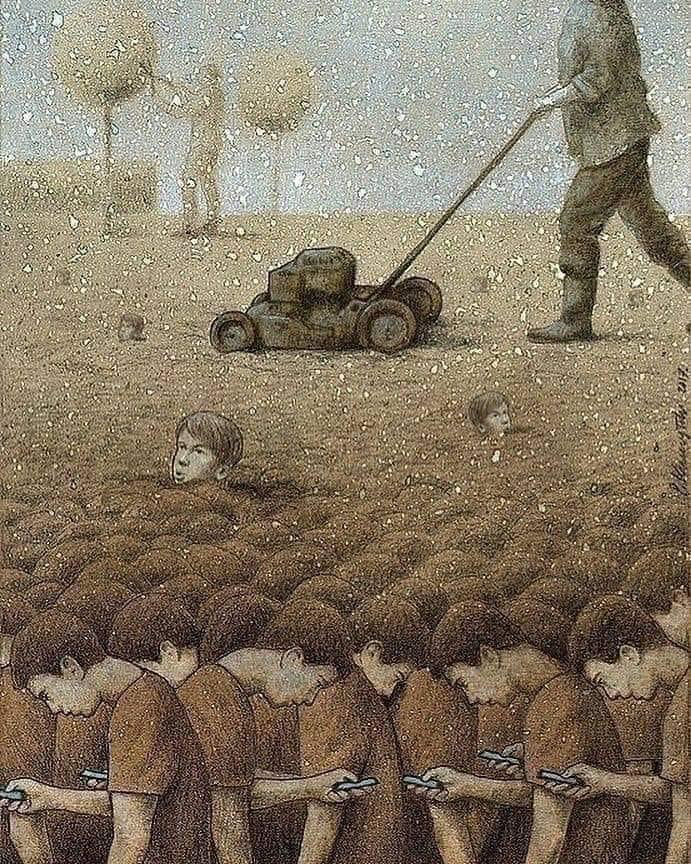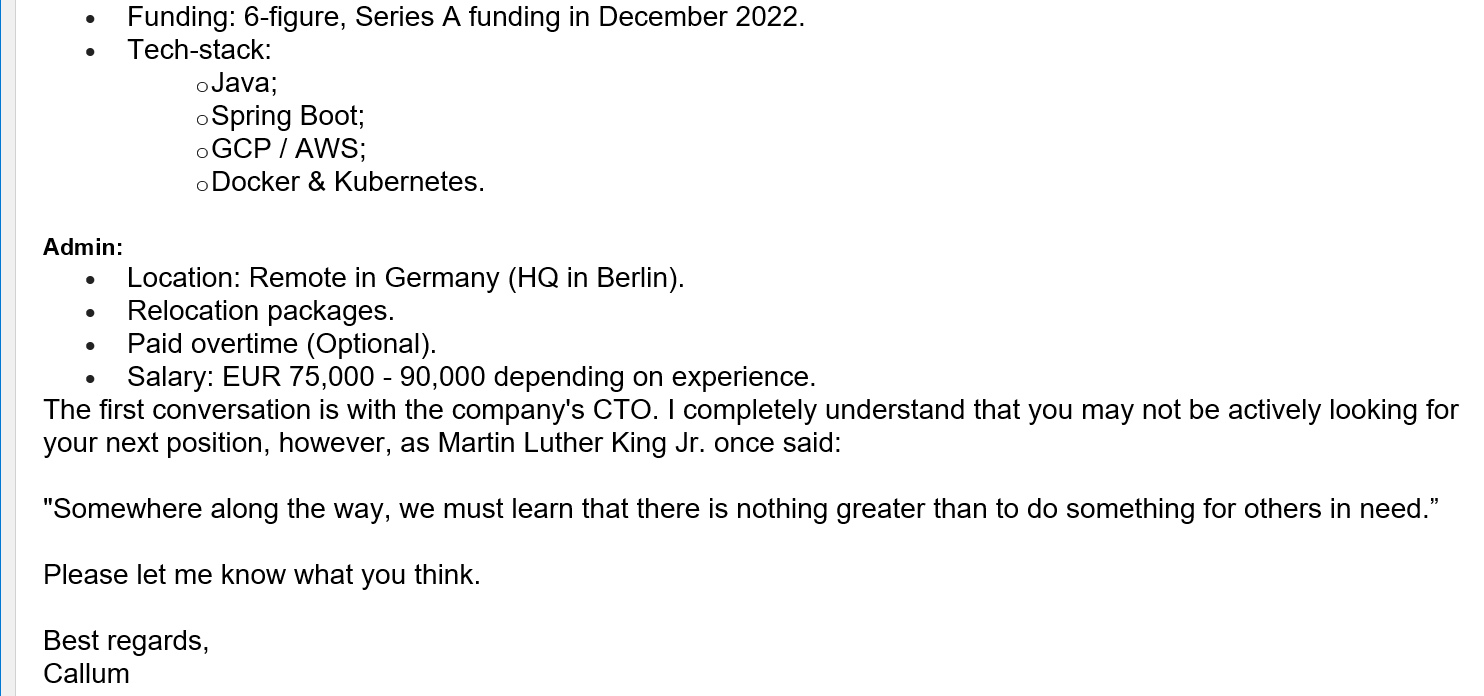Hannah Arendt 1974 interview with Roger Errera:
Totalitarianism begins in contempt for what you have. The second step is the notion: “Things must change—no matter how, Anything is better than what we have.” Totalitarian rulers organize this kind of mass sentiment, and by organizing it articulate it, and by articulating it make the people somehow love it. They were told before, thou shalt not kill; and they didn’t kill. Now they are told, thou shalt kill; and although they think it’s very difficult to kill, they do it because it’s now part of the code of behavior. They learn whom to kill and how to kill and how to do it together. This is the much talked about Gleichschaltung—the coordination process. You are coordinated not with the powers that be, but with your neighbor—coordinated with the majority. But instead of communicating with the other you are now glued to him. And you feel of course marvelous. Totalitarianism appeals to the very dangerous emotional needs of people who live in complete isolation and in fear of one another.
The moment we no longer have a free press, anything can happen. What makes it possible for a totalitarian or any other dictatorship to rule is that people are not informed; how can you have an opinion if you are not informed? If everybody always lies to you, the consequence is not that you believe the lies, but rather that nobody believes anything any longer. This is because lies, by their very nature, have to be changed, and a lying government has constantly to rewrite its own history. On the receiving end you get not only one lie—a lie which you could go on for the rest of your days—but you get a great number of lies, depending on how the political wind blows. And a people that no longer can believe anything cannot make up its mind. It is deprived not only of its capacity to act but also of its capacity to think and to judge. And with such a people you can then do what you please.
Ω Ω Ω
It seems to me Zygmunt Bauman echoes this:
Such situations emerged, arguably, in pre-modern times as well – in the wake of bloody conquests or protracted internecine strifes which led on occasion to well-nigh complete self-annihilation of established elites. The expectable consequences of such situations were, however, different. A general collapse of the larger social order normally followed. War destruction seldom reached as low as the grass-root, communal networks of social control; communally regulated local islands of social order were now exposed to erratic acts of violence and pillage, but they had themselves to fall back upon once the social organization above the local level disintegrated. In most cases, even the most profound blows to traditional authorities in pre-modern societies differed from modern upheavals in two crucial aspects; first, they left the primeval, communal controls of order intact or at least still viable; and second, they weakened, rather than strengthened the possibility of organized action on a supra-communal level, as the social organization of the higher order fell apart and whatever exchange was left between localities was once again subjected to a free play of unco-ordinated forces.
Under modern conditions, on the contrary, upheavals of a similar kind occur, on the whole, after communal mechanisms of social regulation have all but disappeared and local communities ceased to be self-sufficient and self-reliant. Instead of an instinctive reflex of ‘falling back’ upon one’s own resources, the void tends to be filled by new, but again supra-communal, forces, which seek to deploy the state monopoly of coercion to impose a new order on the societal scale. Instead of collapsing, political power becomes therefore virtually the only force behind the emerging order. In its drive it is neither stopped nor restrained by economic and social forces, seriously undermined by the destruction or paralysis of old authorities.
This is, of course, a theoretical model, seldom implemented in full in historical practice. Its use consists however in drawing attention to those social dislocations that seem to make the surfacing of genocidal tendencies more likely. Dislocations may differ in form and intensity, but they are united by the general effect of the pronounced supremacy of political over economic and social power, of the state over the society. They went perhaps deepest and farthest in the case of the Russian Revolution and the subsequent prolonged monopoly of the state as the only factor of social integration and order-reproduction. Yet also in Germany they went farther and deeper than it is popularly believed. Arriving after the brief Weimar interlude, the Nazi rule undertook and completed the revolution that the Weimar Republic – that uneasy interplay of old and new (but immature) elites which only at the surface resembled political democracy – was, for various reasons, incapable of administering. Old elites were considerably weakened or pushed aside. One by one, the forms of articulation of economic and social forces were dissembled and replaced with new, centrally supervised forms emanating from, and legitimized by, the state. All classes were profoundly affected, but the most radical blow was delivered to the classes that can carry non-political power only collectively, i.e. to the non-proprietary classes, and to the working class above all. Etatization or disbanding of all autonomous labour institutions coupled with the subjection of local government to almost total central control, left the popular masses virtually powerless and, for all practical purposes, excluded from the political process. Resistance of social forces was prevented additionally by the surrounding of state activity with an impenetrable wall of secrecy – indeed, the state conspiracy of silence against the very population it ruled. The overall and ultimate effect was the replacement of traditional authorities not by the new vibrant forces of self-governing citizenship, but by an almost total monopoly of the political state, with social powers prevented from self-articulation, and thus from forming a structural foundation of political democracy.
Modern conditions made possible the emergence of a resourceful state, capable of replacing the whole network of social and economic controls by political command and administration. More importantly still, modern conditions provide substance for that command and administration. Modernity, as we remember, is an age of artificial order and of grand societal designs, the era of planners, visionaries, and – more generally – ‘gardeners’ who treat society as a virgin plot of land to be expertly designed and then cultivated and doctored to keep to the designed form.
There is no limit to ambition and self-confidence. Indeed, through the spectacles of modern power ‘mankind’ seems so omnipotent and its individual members so ‘incomplete’, inept and submissive, and so much in need of improvement, that treating people as plants to be trimmed (if necessary, uprooted) or cattle to be bred does not look fanciful or morally odious.
—Zygmunt Bauman, Modernity and the Holocaust, (Cambridge: Polity Press, 1989), 111-113).

„The Modern World“, Pawel Kuczynki





